EU leaders have vowed to return to the thorny issue of leveraging immobilised Russian assets as an extraordinary loan to Ukraine in December's summit.
EU leaders significantly watered down language in their summit conclusions on the €140 billion reparation loan for Ukraine as sticking points over legal ramifications remain.
Instead, they said they would "revert to this issue at its next meeting" in December, stressing that "Russia's assets should remain immobilised until Russia ceases its war of aggression against Ukraine and compensates it for the damage caused by its war".
While hailing the decision by the EU and US to slap new sanctions on Russia, Ukrainian President Volodymyr Zelenskyy called for EU leaders to reach an agreement on the loan as soon as possible. "It is a political decision," he told reporters in Brussels.
Belgian Prime Minister Bart De Wever, whose domestic jurisdiction hosts the bulk of the assets, told reporters that there had been little "enthusiasm" around the leaders' table when asked if they would be willing to provide liquidity guarantees.
"It was not an overwhelming number of people who said they’d be willing," he explained.
Relive our rolling coverage below:

 ${title}
${title}
Live ended
That's a wrap from us!
That's it from us for the night, thank you for following our rolling coverage and have a good night.
Belgian resistance holds up €140 billion loan for Ukraine at EU summit
Belgium held its ground during Thursday's summit, preventing a breakthrough on an audacious plan to issue a €140 billion loan to Ukraine using the immobilised assets of the Russian Central Bank.
Belgian Prime Minister Bart De Wever raised demands in exchange for his blessing, calling for the "full mutualisation" of financial risks and the provision of airtight guarantees from all member states. He also urged that Russian sovereign assets held in other European jurisdictions be added to the common pot.
Read our wrap of the summit's most pressing issue:
Belgian resistance holds up €140 billion loan for Ukraine at EU summit
After a summit of EU leaders, Belgian Prime Minister Bart De Wever complained he had not received answers to all his concerns about a groundbreaking plan to is…
De Wever: Leaders 'torn' between desire to funnel cash to Ukraine and acknowledgement of 'risk'
Let's bring you some more lines from Belgian Prime Minister Bart de Wever.
“My impression is that many heads of government are a bit torn between their willingness to support Ukraine (...) and [the fact] they have to acknowledge that these questions are real, that the risks are real and the guarantees need to be there. And it's a bit of a mixed feelings atmosphere around the table," he explained.
De Wever said that the most important question that needs to be tackled is how to ensure robust guarantees in terms of liquidity to prepare for the hypothetical situation that the assets are unfrozen and need to be paid back.
Member states had been unenthustiastic about providing that guarantee, he explained.
"If it’s not from the member states that this guarantee will come, it is from me a question mark: from where else could this come? I did not receive an answer to this question."
Zelenskyy earlier said that Ukraine would require the financial assistance in 2026. Asked about the timeline for upcoming talks to unblock the deadlock before the next summit in December, De Wever said: "It is of course very urgent."
"We have few weeks and the problems are not to be underestimated."
Little ‘enthusiasm’ among EU leaders for underwriting ‘reparations loan’, Belgian PM says
Belgian Prime Minister Bart de Wever has just finished briefing reporters on leaders' discussions on leveraging immobilised Russian assets as a €140-billion loan to Ukraine.
One of the core demands of Belgium, in whose jurisdiction a bulk of the assets are held, is a liquidity guarantee in the hypothetical event of Russia claiming back the assets.
"These guarantees need to be not vague but concrete, because markets are watching. You do not have a backstop for that," de Wever said. "There would be heavy consequences for the financial system and even for the eurozone."
He added that he had asked his counterparts whether they would be willing to give that guarantee, but that "this question was not answered with tsunami of enthusiasm around the table".
"It was not an overwhelming number of people who said they’d be willing," he then added.
The Belgian premier also warned that in the event of the Russian Federation launching legal action in response to the leveraging of the assets as a loan, the cost would be much more than the value of the assets themselves.
"We're talking about the money and the damages," he said. "That's enormous."
An estimated €210 billion in Russian assets were frozen in the EU following Russia's invasion of Ukraine in 2022. Some €185 billion are estimated to be held in Euroclear, a Brussels-based clearing house.
Chinese restrictions on rare earths are a economic 'coercion', says Macron.
French President Emmanuel Macron on Thursday evening, following the European summit, described China’s recent controls on rare earths as “coercion,” calling for a stronger response from the European Commission to global trade threats.
Member states remain divided on how to respond to China’s aggressive trade policy — some seek to protect Beijing’s investments in their countries, while others aim to preserve access to the Chinese market.
France, Germany, and Poland had called for the issue to be brought to the summit table.
The EU has a trade defence tool, the so-called Anti-Coercion Instrument, considered a measure of last resort, which can only be implemented once economic coercion by a third country against the EU has been established.
"We have instruments that we know well, particularly when it comes to coercion. Investigations must be launched to look into this, and we need a much more systematic approach to economic security," Macron said on the issue of unfair trade competition from China.
'We must do everything in our power to tackle housing crisis,' says Costa
"The European institutions are fully engaged in helping address the housing crisis. We must do everything in our power to tackle it. It is what our citizens expect from us," European Council chief António Costa said during a press conference after the EUCO summit.
"Our debate [on housing] has been very concrete, and it offered political guidelines for the preparation of the European Affordable Housing by the European Commission," he said, adding that "a new cycle for housing policy" has been opened with this debate.
"Housing is and will remain a national competence, but some of the challenges would of course benefit from a coordinated European approach," European Commission President Ursula von der Leyen said, announcing that the European Affordable Housing Plan will be presented by the end of the year.
In their conclusions, the EU leaders called on the European Commission "to swiftly present an ambitious and comprehensive plan for affordable housing, [...] having due regard for the principle of subsidiarity and national competences."
Merz: I would make the same argument as Belgium if the frozen Russian assets were in Germany
German Chancellor Friedrich Merz expressed his political support for the assurances sought by the Belgian government regarding the frozen Russian assets held in Belgium, at the end of the EU leaders' summit in Brussels.
“I would use the same argument if the assets were in Germany. Today we took a step forward that should not be taken for granted. We will do what we can to move forward. I am sure all member states will sign it up, but we need to further discuss liability,” the chancellor said.
The goal for the German chancellor is to have a political agreement by the end of the year now that leaders have tasked the Commission with deepening technical work on the topic.
“We have no model or previous cases. It is unique, we don't know which impact it will have,” Merz said.
Macron: US sanctions on Russia are 'a turning point'
Emmanuel Macron told reporters he sees the decision by Washington to impose sanctions on two of Russia's largest oil providers, Rosneft and Lukoil, as a "turning point".
The sanctions freeze all US-based assets of Rosneft and Lukoil and bar American firms and citizens from doing business with them. Those who bypass the measure risk facing secondary sanctions.
"It is a massive blow to the financing of Russia's war effort," Macron added, stressing that the Russian economy "is beginning to suffer" from the various packages of sanctions Western allies have imposed on Moscow for its full-scale invasion of Ukraine.
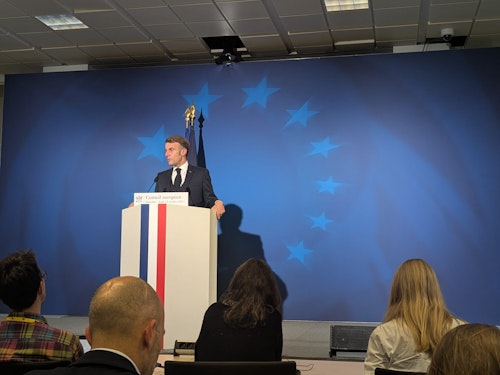
Zelenskyy asked Meloni for support in rebuilding Ukraine’s energy infrastructure
Ukrainian President Volodymyr Zelenskyy asked Italy's Prime Minister Giorgia Meloni during a bilateral meeting for support in rebuilding Ukraine’s energy infrastructure, which has been severely affected by recent Russian attacks on the eve of winter.
This was already been done in the past through the installation of generators supplied by Italian companies, Euronews learnt from Italian sources.
According to the same sources, Meloni said that the Italian government will assess how to intervene to help the civilian population.
Meloni left the Europa Building after the conclusion of the EUCO without answering any questions from the journalists.
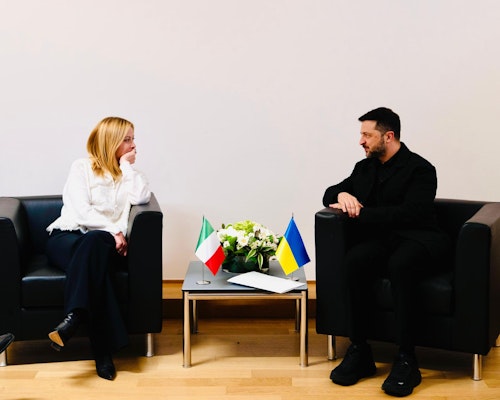
Macron: Final agreement on financial support for Ukraine set for December
French President Emmanuel Macron told reporters in a press conference at the end of the summit that leaders have tasked the Commission to come up with "various technical arrangements" to continue providing long-term financial support for Ukraine.
Despite not being able to agree on the parametres for a reparation loan for Ukraine - through which the EU would use immobilised Russian assets to finance Ukraine's defence and reconstruction - Macron said leaders "reaffirmed" their commitment to Ukraine's financial stability.
"The Commission has been given a mandate to reach a final agreement in December," he said.
Sánchez: 'Complex debate on climate target'
"We acknowledge that [the one on climate target] is a complex debate, that needs constructive positions, adapting to each member state's situation," said Spanish Prime Minister Pedro Sánchez during a press conference after the EUCO.
The 27 EU leaders discussed the Commission's proposal to reduce greenhouse gas emissions by 90% by 2040, giving political indications to environment ministers who will set the final compromise on 4 November.
The summit's conclusions on the issue seem to represent a win for the countries that push to water down the proposal.
The leaders agreed to stress the importance of "defining an adequate level of high-quality international credits", which could result in more than the 3% proposed by the Commission. They also expressed the need for a revision clause, linked not only to the "latest scientific evidence" and "technological advances", but also to "evolving challenges" and "opportunities for the EU’s global competitiveness".
Sánchez, one of the defenders of an ambitious climate action, underlined that "the EU has spent more than €40 billion in economic losses as a result of the effects of climate change" and claimed that the green agenda is "one of the engines of competitiveness, not an obstacle for it".
The summit is over
EU leaders have concluded their talks and we should hear soon from the Presidents of the European Commission and the European Council, as well as from some heads of state and government.
Gaza: EU leaders ask parties to commit to implementing all phases of Trump's peace plan
EU leaders on Thursday called on all parties involved in the conflict in Gaza to "fully commit to implementing all phases" of US President Donald Trump's plan to end the war, and "to refrain from any actions that jeopardise the agreement".
In the final conclusions of the summit, leaders welcomed the agreement over the first phase of Trump's plan and the outcomes of the Sharm el-Sheikh summit held on 13 October.
They did not, however, make any reference to the political role the EU can play in the transition phase in Gaza, focusing instead on the bloc's humanitarian role.
The EU, they said, "will support the rapid, safe and unhindered delivery of humanitarian aid in coordination with international partners".
As in previous summits, the leaders called for a "just and lasting peace based on the two-state solution," and reiterated the support of the UN agencies in the region as well as the support for the Palestinian Authority. They also once more took aim at illegal Israeli settlements and increasing Israeli violence in the West Bank and East Jerusalem.
"It calls on Israel to reverse the E1 settlement plan that further undermines the two-state solution," the leaders added.
EU27 agree on strong words against 'unfair' trade practices
In the final conclusions of the EU summit, the 27 member states agreed on calling on the European Commission, which is responsible for trade matters, to make use of "all EU economic instruments" to tackle "unfair" trade practices.
These tools include the anti-coercion instrument, which was adopted in 2023 to protect the EU from undue pressure from third countries. It allows restrictions on the right to participate in public procurement tender procedure, restrictions on licence, or for instance restrictions on trade in services and trade-related aspects of intellectual property rights.
The wording of the conclusions is strong in the context of growing global trade threats.
The European industry is heavily affected by China’s recent restrictions on rare earth exports, which are essential for the automotive sector, green technologies, defence, and digital industries.
France, Germany, and Poland had been pushing during the preparation of the summit for the issue to be addressed.
Cannelloni and fillet: Here's what EU leaders ate
EU head of states continued to discuss sensitive topics on the political agenda over cannelloni with herbs and courgette velouté. For main, they were served fillet of brill with chorizo and pepper, followed by a fig meringue cake for dessert.
Belgian resistance weakens Reparations Loan for Ukraine
Ukraine was enjoying a high moment after yesterday's decision by the US to increase, for the first time, sanctions against Russia. The country was hoping that EU leaders would endorse a groundbreaking plan to issue a €140 billion reparations loan based on Russia's immobilised assets, the bulk of which is held in Belgium.
After attending the summit, President Volodymyr Zelenskyy urged leaders to take the step.
"Money we need it in 2026 and better to have it at (the) very beginning of the year," he said.
"I don't know if it’s possible, not everything depends on us," he added. "We understand who can block and we can work with these people," he said, seemingly referring to Belgium.
In the end, Belgian Prime Minister Bart De Wever appeared to hold his ground.
Going into the meeting, De Wever had listed three demands in exchange for his blessing:
- The "full mutualisation" of risks, including legal claims filed by Russia.
- Guarantees to ensure that, if the assets are unfrozen and the money has to be paid back, "every member state will have to chip in".
- An obligation for all European countries that hold Russia's sovereign assets to participate.
"If we move, we must move all together, that's European solidarity," he said. "If these three demands, which are quite reasonable, I think, are met, then we can go forward. If not, I will do everything in my power at the European level and also at the national level, politically and legally, to stop this decision."
During the day, new drafts were circulated with expanded language on burden-sharing, collective solidarity, respect for international law and G7 coordination. But it seems the overture failed to convince De Wever, who, perhaps deliberately, had raised a high threshold for his fellow heads of government.
The final language agreed by leaders is considerably weaker, speaking ambiguously about exploring "options" to meet Ukraine's military and financial needs for the next two years.
The frozen assets are mentioned but are not linked to the assistance itself. "Subject to EU law, Russia's assets should remain immobilised until Russia ceases its war of aggression against Ukraine and compensates it for the damage caused by its war," the text only reads.
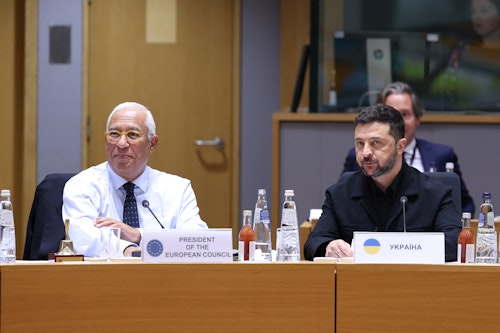
Head of CSU calls on the EU to pressure Kyiv to prevent Ukraine's refugee from coming to Germany
Markus Söder, head of Bavaria’s conservative party, a member of Chancellor Friedrich Merz’s coalition, on Thursday called on the EU to pressure Kyiv to prevent young men — arriving in Germany — from leaving Ukraine.
“We must seriously control and reduce the growing influx of young men coming from Ukraine,” Söder said in German daily Bild, adding: “The EU and Berlin must pressure Ukraine to reverse the eased exit rules.”
Since Kyiv’s decision to ease martial law and allow young adult males to leave the country, the number of Ukrainians seeking refuge in Germany has surged dramatically.
"It helps no one when more and more young Ukrainians come to Germany instead of defending their homeland,” the leader of the Christian Social Union (CSU) said, arguing that Ukraine needs “Ukrainian soldiers to defend their own country.”
In August, Söder already advocated for reducing benefits for certain Ukrainian refugees, who currently receive a citizen's allowance.
After intense talks, EU leaders water down language on Ukraine loan
EU leaders have failed to give an explicit mandate to move forward with the ground-breaking plan to use Russia's frozen assets and issue a €140 billion loan to Ukraine.
Belgium, which holds the majority of the assets, have raised a host of demands and concerns that, it seems, the other leaders did not manage to fully placate.
The final text does not close the door but speaks in broad terms and falls short of the more ambitious wording included in previous drafts:
"The European Council commits to address Ukraine's pressing financial needs for 2026-2027, including for its military and defence efforts. Therefore, the European Council invites the Commission to present, as soon as possible, options for financial support based on an assessment of Ukraine's financing needs and invites the Commission and the Council to take work forward, in order for the European Council to revert to this issue at its next meeting. Subject to EU law, Russia's assets should remain immobilised until Russia ceases its war of aggression against Ukraine and compensates it for the damage caused by its war."
EU leaders agree conclusions on Ukraine
The leaders of the European Union, except Hungary's Viktor Orbán, have endorsed joint conclusions on support for Ukraine. But it's unclear how the €140 billion loan for Ukraine, the most contentious part of the debate, has been worded in the final text.
"Today, the #EUCO delivered an important message: The EU is committed to addressing Ukraine's pressing financial needs for the next two years, including support for its military and defence efforts," said António Costa, the president of the European Council.
"Russia must stop the war immediately."
Today, the #EUCO delivered an important message: The EU is committed to addressing Ukraine's pressing financial needs for the next two years, including support for its military and defence efforts.
— António Costa (@eucopresident) October 23, 2025
Russia must stop the war immediately.
Spanish fighter jets patrolling Lithuanian airspace after Russian incursion
We've received more details from the Lithuanian Foreign Ministry on the reports of an incursion by a Russian military plane earlier.
"A Russian SU-30 aircraft and an IL-78 refueling aircraft entered Lithuanian territory by approximately 700 meters and left after remaining in Lithuanian airspace for about 18 seconds," the statement reads.
"The response from Lithuania and its allies was swift. Two Spanish Eurofighter Typhoon jets, currently serving in the NATO Air Policing Mission, were immediately scrambled, flew to the area of the violation, and are continuing their air patrol at this time. We thank our service members for their professionalism."
Two Russian aircraft briefly enter Lithuania’s airspace, military says
In a post on X, Lithuania’s President Gitanas Nausėda slammed what he called a “blatant breach of international law and territorial integrity.”
Frozen Assets: Two possible scenarios for the leaders' conclusions
EU leaders are requesting more time to make a political decision on frozen assets, with the issue expected to be revisited, and potentially resolved, at the next European Council meeting in December, Euronews has learned from a diplomatic source.
The leaders are listening to the requests from the Belgian government, which is asking for reassurance on the risks connected to the use of frozen assets to finance the reconstruction of Ukraine, as most of the assets are in Belgium.
The diplomatic source said that in the conclusion, there are likely two possible scenarios: a generic reference on frozen assets with the ambition to keep the discussion going and give the European Commission a legislative mandate, or more specific reference to the conditions and guarantees the member states will need to deepen.
Leaders move to Middle East
The 27 leaders are currently discussing the situation in the Middle East, which has signficantly changed after the peace deal brokered by US President Donald Trump.
Just a few weeks ago, member states were seriously contemplating a proposal to partially suspend the EU-Israel Association Agreement and sanction extremist ministers of the Israeli government in reaction to the legal breaches and humanitarian catastrophe inside the Gaza Strip. For now, those proposals are expected to remain on the table as a leverage tool, even if they have virtually no chance of ever being approved.
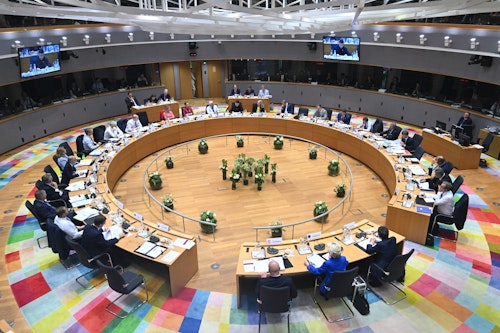
Leaders call on the Commission to consider 'withdrawing' legislative proposals in simplification push
Summit conclusions on bolstering EU competitiveness in the face of fierce global competition have just been published. They include a call on the European Commission to "consider the withdrawal" of legislative proposals "where appropriate."
This wording was not included in previous drafts of the conclusions seen by Euronews - and represents a win for member states pushing to accelerate simplification of rules and upcoming regulation.
Earlier this week, 19 EU leaders jointly penned a letter to European Council President António Costa calling for a faster and more aggressive streamlining of regulation. German chancellor Friedrich Merz spearheaded these efforts, hoping to give more breathing space to critical industries like the auto sector in the highly energy intensive German industry.
Yet the initiative is running into early hurdles.
On Wednesday, the European Parliament rejected a bill to simplify sustainability rules for European firms by a slim margin of nine votes, meaning simplifying simplification is not a given.
A first at the summit: housing crisis
For the first time in the history of the European Council, leaders have discussed the housing crisis.
The issue has become a major preoccupation for the vast majority of governments, which see it as a make-or-break for local, regional and even national elections. Citizens are increasingly angry about sky-high rental prices and the lack of available apartments due to the surge in tourism.
Although the EU has limited competences in housing, European Commission President Ursula von der Leyen has fully embraced the topic, promising several initiatives in the coming months.
The conclusions on housing cover just two paragraphs:
- In the light of the housing challenges faced by many citizens in the European Union, including access to affordable housing, the European Council discussed the various dimensions of this pressing issue.
- The European Council calls on the Commission to swiftly present an ambitious and comprehensive plan for affordable housing, the aim of which should be to support and complement Member States’ efforts.
Russian military planes have entered Lithuania's airspace, President says
Russian planes have violated Lithuania's airspace, the country's President, Gitanas Nausėda, said in a video message on X from the European Council summit in Brussels.
"This is a blatant breach of international law and territorial integrity of Lithuania. Once again, it confirms the importance of strengthening European air defence readiness," Nausėda said, adding that he would summon the Russian embassy's representatives to "protest against reckless and dangerous behaviour".
In September, Russian military planes entered Estonia's airspace, and several European countries documented suspected incursions of Russian drones. It's prompted the bloc to vow to channel its defence spending into initiatives that would shield its eastern flank from intruding aerial vehicles by 2027.
This evening, Russian military planes violated Lithuanian air space. This is a blatant breach of international law and territorial integrity of Lithuania. Once again, it confirms the importance of strengthening European air defence readiness.@LithuaniaMFA will summon Russian… pic.twitter.com/0GS6OrKaRx
— Gitanas Nausėda (@GitanasNauseda) October 23, 2025
Leaders await Lagarde's verdict on the Ukraine loan
As we previously reported, the 27 leaders have put aside the plan to use Russia's frozen assets to issue a €140 billion loan to Ukraine. While they debate other topics, their ambassadors and aides are fine-tuning the conclusion to placate Belgium's multiple concerns and demands.
The country has a particular stake because the bulk of the assets are held at Euroclear, a central securities depositary based in Brussels.
But another view is much anticipated: that of Christine Lagarde, the president of the European Central Bank. Lagarde had previously warned against any attempt to confiscate the assets, arguing it would endanger the eurozone's stability and undermine the role of the euro as a reserve currency.
Ever since the plan for a reparations loan began circulating, Lagarde has kept her opinions more private. This is why leaders are eager to hear directly from her when she joins the room at dinner time.
Her assurances could tip the balance and make Belgium sign up to the plan.
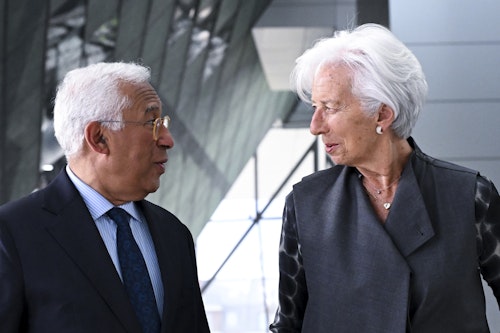
Discussion on climate and competitiveness is going well
The discussion focused on climate policy and competitiveness, two issues that many leaders find to be increasingly incompatible, is going well, according to officials.
No major changes are expected to happen in the conclusions. The talks are being kept at a strategic level, without going into the numbers of targets and deadlines.
It seems the all-out battle that some journalists had predicted is not going to unravel, after all.
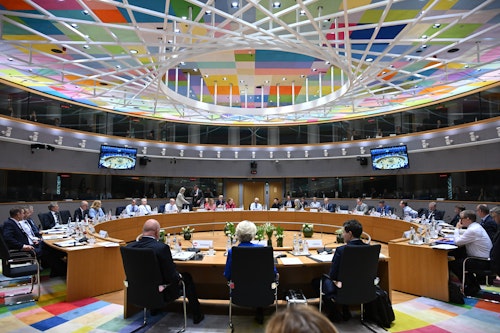
Why did the US sanction Lukoil but the EU didn't?
The US decision to sanction two of Russia's largest oil providers, Rosneft and Lukoil, has been widely celebrated by Europeans, who have been pleading with Donald Trump to get tougher on Moscow.
The sanctions freeze all US-based assets of Rosneft and Lukoil and bar American firms and citizens from doing business with them. Those who bypass the measure risk facing secondary sanctions.
But the news has also raised an uncomfortable question: after 19 packages of sanctions, the EU has not yet targeted Lukoil. (Sanctions on Rosneft were previously applied and expanded this week.)
"Lukoil is more complicated" than Rosnet, which is state-owned, explained a senior EU official, speaking on condition of anonymity. "The problem is that, for historical reasons, we have this connection with Lukoil" with "refineries in Bulgaria and Romania still controlled by Lukoil".
The official was quick to note that Brussels was "happy" with the sanctions imposed by Washington and admitted: "We need to find a way to disentangle (ourselves) before we can fully impose a transaction ban."
The US sanctions have also brought to the fore the exemption granted three years to Hungary and Slovakia to keep buying Russian crude through the Druzhba pipeline. Back then, the exemption was presented as temporary, something that would eventually be revised and disappear. But the issue has never come back to the table, creating an awkward loophole in the bloc's sanctions regime.
Last year, the European Commission had to mediate in a bitter dispute between Hungary and Slovakia, on one side, and Ukraine, on the other, after Kyiv decided to strengthen sanctions on Lukoil and restrict the transit of Russian crude oil through its territory.
Photo credit: Associated Press.
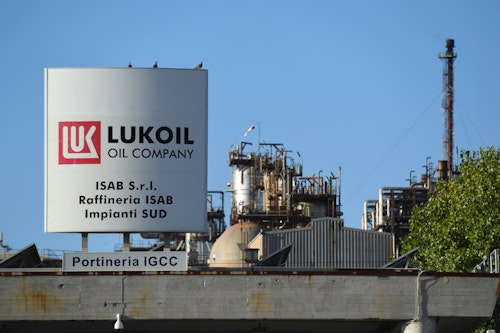
China suspends purchases of seaborne Russian oil
The largest Chinese oil companies have suspended their purchases of seaborne Russian oil, Reuters reports. The decision follows US sanctions on Russian oil giants Rosneft and Lukoil, which account for nearly half of Russia’s oil exports.
China’s state oil companies — PetroChina, Sinopec, Cnooc, and Zhenhua Oil — will refrain from handling seaborne Russian oil, at least in the short term, due to concerns over the sanctions, the sources said.
The Asian giant imports about 1.4 million barrels of Russian oil per day by sea.
This decision comes as Indian refiners — the largest buyers of seaborne Russian oil — are also preparing to drastically cut their crude imports from Moscow in order to comply with US sanctions.
In response to Russia’s refusal to end the war in Ukraine, the US has decided to freeze all Rosneft and Lukoil assets in the United States and to prohibit all American companies from doing business with the two Russian oil giants.
EU sensing increased ‘appetite’ from US to coordinate sanctions and pile pressure on Putin
EU officials say the 19th package of sanctions on Russia adopted earlier on Thursday was coordinated with G7 partners, notably the Trump administration, in order to pile pressure on the Kremlin as it resists demands for a ceasefire along current battle lines.
“Now for the first time in a few months there was also quite an appetite from our American friends for discussion,” one senior EU official said.
“We had a lot of conversation on aligning our targets… and we will continue with that moving forward.”
Sanctions announced last night by the US Treasury, which target Russian oil giants Lukoil and Rosneft, are the first to be announced by the second Trump administration and signal a sharp shift in policy as the White House grows increasingly frustrated with Russian President Vladimir Putin's refusal to bend on his red lines.
The move from Washington has uplifted the mood among diplomats and officials at the Brussels summit, with several describing it as a significant boost to Transatlantic unity on Ukraine. The EU's top diplomat Kaja Kallas told reporters earlier that the bloc was "very happy" with the breakthrough.
Slashing CO2 emissions remains a sticking point among EU leaders seeking more competitiveness
Proposed by the European Commission, the 2040 climate target of 90% will require member states to drastically cut greenhouse gas emissions in line with the EU's climate law.
This is one of the major contention points among EU leaders as the bloc is pushing for greater competitiveness within its single market — and beyond — and climate pledges will entail an enormous amount of money for the industry, businesses and households to keep up with the decarbonisation pace.
While the road to climate-neutrality is meant to increase near-term investment and compliance costs for energy-intensive industries and raise transitional price pressures for fossil fuel–dependent households, it would also pave the way for long-term and sustainable market opportunities in clean technology, energy efficiency and low-carbon exports. Backtracking from environmental pledges would undermine the European Green Deal, the EU's flagship initiative to become carbon neutral by 2050.
The distribution of effort, however, would depend on how national governments would deploy targeted funds and industrial support to protect vulnerable households and preserve competitiveness.
Member states are discussing the use of so-called international carbon credits, which in practice would mean that EU countries would be allowed to offset a percentage of their own emissions abroad. The Commission proposed 3%, but Italy, for example, has suggested 5%.
EU countries are due to announce an official climate target on 4 November, which should fall short of the 90% proposed by the EU executive.
EU countries again delay decision on climate goals before COP30
EU talks will continue on two key climate targets — 2035 and 2040 — ahead of the upcoming COP30 summit in Belém, Brazil.
EU leaders are now discussing competitiveness
EU leaders have adopted conclusions on defence, and are now discussing one of Brussels' favourite buzzwords: competitiveness.
This evening's agenda includes simplification and the green and digital transitions.
European leaders are expected to urge the Commission to swiftly introduce further ambitious simplification packages, particularly in the automotive industry, military mobility, digital services, financial services, transport, the environment, energy and food safety.
António Costa, president of the European Council, also informed the EU27 of his intention to convene an informal Council meeting on 12 February to discuss the same issue.
Housing prices in the EU have increased by more than 58% from 2015
For the first time, European Union leaders are debating the issue of housing affordability and accessibility at the highest level.
“We are all aware that the European Union is facing an exceptionally challenging geopolitical landscape. However, it is equally essential that we also address the daily concerns of European citizens,” António Costa, president of the European Council, said after a meeting with the presidents of the European Committee of the Regions on Wednesday.
According to recent EU surveys, housing affordability and accessibility are among the most urgent concerns of Europeans.
On average, housing prices in the EU have increased by more than 58% over the last decade.
In 2024, EU households spent an average of 19.2% of their disposable income on housing; however, there were significant differences between member states and income groups.
Housing prices - Eurostat
A Flourish data visualization by BRUSSELS
France and Spain back 2035 ban on diesel and petrol car amid law's upcoming revision
In a letter sent to EU leaders, Paris and Madrid state that the 2035 target for automotive manufacturers to produce only electric cars must be kept, but ask for "made in Europe" incentives to help the struggling industry on the continent.
Paris and Madrid argued that if the ban on zero-emission cars is reversed, the bloc will not succeed in achieving carbon neutrality by 2050, a pledge that is now binding under the EU’s climate law and will likely be discussed by EU leaders during the European Council in Brussels on Thursday.
They also say that it’s “not acceptable” for plug-in hybrids to be favoured after 2035, a demand that has been contested by many member states, namely Germany, Italy and Slovakia, which claim their industries are being severely affected by the mandatory shift to electrify vehicles.
Germany, a long-time automotive powerhouse producing BMW, Mercedes-Benz and VW, has been vocal about the decline of its car industry, lobbying strongly against the ban on new diesel and petrol cars by 2035.
While yet to be officially announced, European Commission President Ursula von der Leyen told governments in an official letter dated 20 October that she had "decided to accelerate the review of the regulation on CO2 emission standards for cars and vans."
This is one of the many files the EU executive has been "simplifying" to balance the EU’s climate pledges with competitiveness.
Zelenskyy: Ukrainian-made arms would be prioritised under reparation loan
Ukrainian President Volodymyr Zelenskyy also told reporters that production in his country would be prioritised under the ‘reparation loan’ currently being discussed by EU leaders in Brussels.
Zelenskyy said that his war-torn country is using three times less of its defence production capabilities.
“We have technologies that the Europeans don’t have because of the war,” the Ukrainian leader stressed, adding: “We will share them, and we will make coproduction”.
If approved by the EU27, Ukraine's president stated that they will channel Russian frozen assets into Ukrainian production. "It’s cheaper and quicker".
The Ukrainian leader noted that drones are the most essential piece of defence equipment, but that electronic warfare systems and missiles are also important. “We will increase them in the case we have additional money”.
Zelenskyy also acknowledged that some of the funding would go towards European production. “It’s understandable because the money is from Europe”.
However, US defence production will also be part of the equation, particularly given their advanced air defence systems.
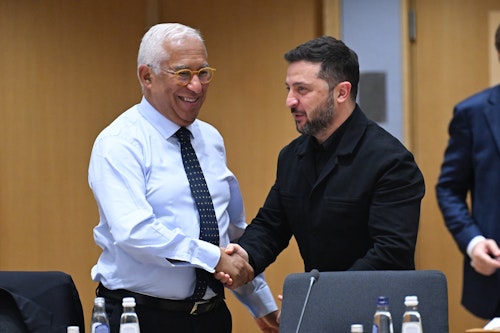
Zelenskyy says Ukraine needs money in early 2026
Asked when Ukraine needs to have money from the reparation loan EU leaders are struggling to define the parameters of, Zelenskyy said: "Money we need it in 2026 and better to have it at very beginning of the year."
"I don’t know if it’s possible, not everything depends on us," he also said.
"We understand who can block and we can work with these people," he added, saying that "one is not too much."
Belgium, where most of the immobilised Russian assets are held, has made clear it will not approve the reparation loan unless it secures maximum solidarity and risk sharing from the other member states.
'China is not interested in our victory and Russia losing,' says Zelenskyy
In his last question at the press conference, Volodymyr Zelenskyy sharply criticised China for its long-standing support for Russia's full-scale invasion.
"China is a very difficult and really complicated question," he said. "We don't have a permanent dialogue with XI Jinping. We had some conversations, (and) he told me he won't sell weapons (to Russia)."
"China helps Russia. It doesn’t help Ukraine and is not interested in our victory and Russia losing," he added.
Zelenskyy said that all countries dealing with Russia, including Europe and the US, will "understand what's going on" between Kyiv and Beijing.
He said China is not interested in making Ukraine "strong" and fostering "unity between the US and Europe".
"They're not interested in a weak Russia," he said. "That's why they help Russia."
In its latest package of sanctions, the EU blacklisted 12 entities in mainland China and Hong Kong, accused of helping Russia get hold of prohibited items.
Zelenskyy says he doesn't know about a 12-point plan. 'More pressure on Russia, that's the plan."
Volodymyr Zelenskyy says he doesn't know anything about an alleged 12-point peace plan being prepared by Ukrainian and European officials, as Bloomberg reported earlier this week.
"Between us, I don’t know about the plan," he said, prompting laughter in the room.
Zelenskyy admitted that his "European friends are nervous" about the possibility of another country presenting a peace plan on Russia's behalf, which would be highly detrimental to Kyiv's and Europe's interests.
"If Russia is ready to speak, we’re ready to speak, this is the plan," he said. "The plan begins with a will to sit and speak, not to stand (up) and fight using missiles against civilians," he added, referring to the recent Russian strike against a kindergarten in Kharkiv.
"It doesn't show they (Russians) want to stop this war," he said. "More pressure on Russia and they will sit and speak, and I think that’s the plan."
Zelenskyy begins press conference paying tribute to journalists killed by Russia
President Volodymyr Zelenskyy has begun his press conference paying tribute to the two Ukrainian journalists killed today by a Russian strike in the city of Kramatorsk. Another journalist was injured. The professionals worked for the 'Freedom' TV channel.
"Thank you to all the media community for your work and your support for Ukraine," Zelenskyy said. "Truth is always pressure."
Full press room waiting for Zelenskyy
The press room in the EU Council is absolutely packed as journalists wait for Ukrainian President Volodymyr Zelenskyy to speak.
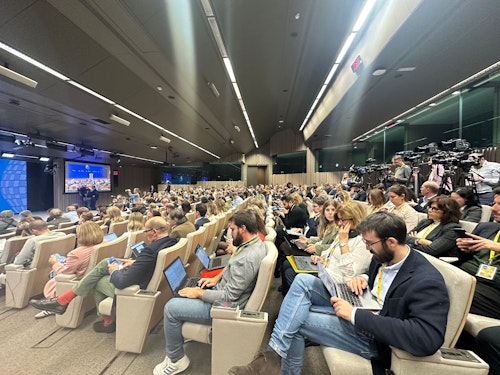
Portugal’s PM confident on positive talks on grid development
Luís Montenegro stressed the importance for the EU to have a common energy market with access to affordable energy and that is less dependent on energy providers from outside the bloc.
“I think we will be able to have in today’s Council conclusions a specific reference to the grid interconnections, which has been a warhorse for Portugal,” Montenegro told reporters, noting the need to shift from words to action.
“It is pointless to reiterate the need for a common policy, a common price-setting policy in order to reduce energy prices and not create the infrastructure that can truly help boost it,” Montenegro added.
The Portuguese PM noted it’s been more than 11 years since Portugal, Spain, France and the European Commission signed compromises to increase electricity capacity and regretted the lack of positive development ever since.
“It’s still viable to reach a 15% cross-border transmission by 2030, up from the current 2%-3% our [Portuguese] grid can handle today,” Montenegro said referring to the EU’s target to increase the capacity of electricity grids to allow countries to transfer a certain percentage of their electricity production to neighbouring EU countries.
“It’s unforgivable if we continue to contemplate this matter without tackling it,” Montenegro added. The premier noted Portugal and Spain have invested heavily in renewable energy with the aim of reducing energy prices, an effort that wouldn't be fully seized without the right grid infrastructure to accommodate the specificities of clean power.
On its upcoming work programme for the year ahead, the European Commission vowed to improve grid governance, upgrading electricity infrastructure, remove existing bottlenecks and cut red tape for cross-border energy projects.
Fiala: 'We in the opposition will continue to support Ukraine'
This is Petr Fiala's last EU summit. He has been the prime minister of the Czech Republic since November 2021.
The Czech Republic held elections earlier this month, in which Fiala's coalition did not win. Instead, Andrej Babiš's populist ANO party managed to secure around 35% of the vote.
Following his defeat, Fiala announced that he would not be seeking re-election as leader of the Civic Democratic Party (ODS), a position he has held since 2014.
Babiš, who held the office of prime minister from 2017 to 2021, is expected to lead talks on forming a new coalition.
"We in the opposition will continue to support Ukraine, and I believe that the new Czech government will provide Ukraine with assistance to the greatest extent possible," Fiala wrote on X.
Na úvod setkání s @ZelenskyyUa jsem mu předal menší dárek – háčkovanou brož.
— Petr Fiala (@P_Fiala) October 23, 2025
Během kampaně mi ji předala jedna paní s prosbou, že ji háčkovala její vnučka a zda ji mohu předat právě panu prezidentovi. Rád jsem tak dnes učinil. 😊
Z řad opozice budeme Ukrajinu i nadále… pic.twitter.com/gTSR8vMwLA
EU should focus on 'joint efforts to enhance their anti-drone and air defence capabilities'
EU leaders are set to call for work on defence to focus "in particular on concrete projects to reinforce Member States’ joint efforts to enhance their anti-drone and air defence capabilities," according to draft conclusions seen by Euronews.
The drone wall, now renamed the European Drone Initiative, is one of the four flagship projects the Commission has said should be financed as a matter of urgency in its roadmap released last week.
The problem? No one seems to agree on what it should look like and therefore how much it will cost.
Andrius Kubilius, the Commissioner for Defence, said last week that Poland and the three Baltic states had costed a drone wall covering their territory alone at around €1bn in a paper released over the summer.
Yet, despite not having put a price tag on it, the EU executive expects the wall to be fully functional by 2027.
In their conclusions, leaders said this work on anti-drone air defence capabilities should be done "a coordinated manner, in particular making full use of the SAFE and EDIP instruments and other relevant existing financial instruments".
The Commission has already allocated the €150bn it plans to raise on the markets to provide the SAFE loans to the 19 member states that asked for funds. They have until the end of November to submit their plans detailing how they want to spend that money. The Commission expects to be able to start disbursing the funds in the first quarter of 2026.
Two-thirds of the €150bn pot has been allocated to countries on the eastern flank.
Disbursement of EU’s €150bn defence loan scheme to start in early 2026
The aim of the SAFE programme is to boost joint procurement, increase interoperability among EU member states and strengthen the European defence industrial ba…
Orbán compared Brussels to a 'vipers' nest' during national day speech
Hungarian Prime Minister Viktor Orbán compared the European Union to a viper’s nest and to an occupation force in his speech delivered in Budapest earlier this afternoon.
Hungary commemorates today the start of the anti-Soviet uprising in 1956. Because of the national day commemoration, Orbán’s participation at the European Council has been delayed.
But that didn't prevent him from sending a message to Brussels: "Leave us alone, let us live freely."
"With your support, we were able to defend the country against the Brussels oppressors. And we protected children from unnatural teachings against the Brussels vipers' nest.”
The prime minister only touched upon the war in Ukraine briefly and reiterated his opinion that the EU’s support to Ukraine amounts to a pro-war policy, and that the coalition of the willing is a pro-war coalition.
"If Brussels didn't obstruct Donald Trump, there would be peace," he claimed.
Orbán also once more made clear his opposition to Ukraine joining the EU, saying: "We want Ukraine to have relations with the EU. Partnership, yes; membership, no, this is what the Hungarian nation demands.”
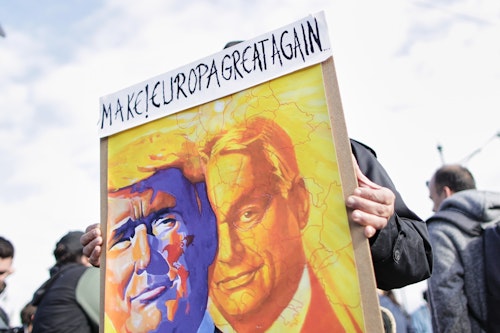
Why US sanctions are a diplomatic win for Europe
The summit is still ongoing, but the EU already has a big reason to celebrate: overnight, the US announced sanctions on Russia, targeting two major oil suppliers, Rosneft and Lukoil.
"We're very happy," High Representative Kaja Kallas said upon arriving at the meeting. "It's an important sign of strength that we’re aligned."
"The US sanctions can be a real game changer when combined with our 19th sanctions package," said Petteri Orpo, Finland's prime minister.
For the past 10 months, basically since Donald Trump's return to the White House, Europeans have been pleading with Americans to tighten the screws on Russia's war machine. But time and time again, Trump refused, hoping that his overtures to Vladimir Putin would pay off in a ceasefire and, ideally, a peace agreement. At times, Trump expressed his hope of revitalising US-Russia relations, causing dismay among Ukrainians and their European allies, who believe Moscow should be held accountable for war crimes and pay reparations.
Gradually, Trump grew exasperated with the Russian leader's uncompromising position. "We get a lot of bullshit thrown at us by Putin, if you want to know the truth," Trump said in July.
This week, the White House cancelled a planned summit in Budapest between the two men after sensing that Russia had no intention to make concessions that could lead to, at least, a ceasefire at the battle line. The debacle prompted the US sanctions, which can have ripple effects across the globe due to the dollar's dominant role.
Europeans can barely hide their sense of vindication with a not-so-subtle "I told you so" attitude. For many, the sanctions are the payoff of an intense behind-the-scenes effort to lobby Trump and make him understand Russia's imperialist view.
"It was enough time to understand that you can negotiate with Russia only by putting the gun on the table,” said Lithuanian President Gitanas Nausėda.
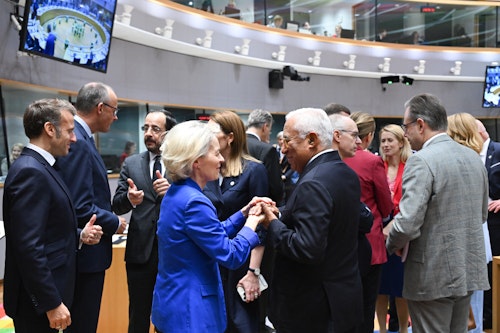
Next up for leaders is defence
European leaders are now having lunch and turning their attention to defence and how to ensure the bloc is capable of defending itself by 2030.
To steer their discussions, the Commission released a roadmap on defence readiness last week.
The roadmap's only novelty is that it puts clear timelines and objectives on targets identified in previous documents including the capability priority areas and the four pan-European flagship projects the Commission believes need to be funded as a matter of urgency.
These include the Eastern Flank Watch, of which the so-called drone wall, now renamed the Drone Defence Initiative, is a key pillar, as well as the European Air Shield and the European Space Shield. The drone wall, for instance, is meant to be fully functional by end of 2027.
According to draft conclusions, leaders will task the Commission to put forward proposals on military mobility and a defence industry transformation roadmap, which are both scheduled to be presented on 19 November.
They also want the EU executive to find more ways to reduce the administrative burden that hinder defence companies' production and expansion.
The EU unveils plan for defence ‘independence’ - in production only
With its roadmap for defence, the European Commission wants to boost European production of weapon systems but NATO will keep the operational reins.
Leaders put aside discussion on €140 billion, for now
EU leaders have put aside a debate on the plan to issue a €140 billion loan to Ukraine using Russia's immobilised assets.
Belgium, which holds the bulk of the assets, has raised several concerns and demands in exchange for agreeing to the idea. A new compromise has been tabled to assuage the worries.
"Leaders will come back to the discussion on Ukraine later this afternoon," said an EU official.
The morning session also included an exchange of views with Ukrainian President Volodymyr Zelenskyy, who "briefed the leaders on the latest wave of Russian attacks against civilian targets and Ukrainian energy infrastructure, the financial situation of his country, as well as the most urgent needs of Ukraine’s Armed Forces and the status of recent international efforts to reach a ceasefire," the official explained.
For most capitals, rolling out the loan is a top priority given Ukraine's ballooning financial needs for 2026 and 2027, the cash-strapped state of national budgets and the absence of support from the US.
Chinese restrictions on rare earths could impact the EU's rearmament efforts
Earlier this week, EU Commission President Ursula von der Leyen warned MEPs in Strasbourg about the crisis in the bloc’s supply of critical raw materials, stressing how it is no longer a distant risk, but a problem at “our doorstep”.
Just last week, the EU’s defence industry warned that the continent urgently needs to make its supply chains more resilient and reduce its dependence on critical raw materials.
Experts say the recently announced Chinese restrictions may not stop supplies overnight, but they could still have serious consequences for Europe’s defence sector.
“Expanded Chinese restrictions would hit Europe’s defence industry hard, potentially delaying ammunition production and high-tech systems that rely on critical minerals,” said Daniel Fiott, professor at the Brussels Centre for Security, Diplomacy and Strategy (CSDS).
“It comes at the worst possible time too, just as Europe seeks to rearm and scale up its defence base through greater investment,” he added.
China is not formally on today’s agenda, but EU leaders will discuss the recently announced expansion of restrictions on rare earths, which are critical both for the twin transition and the EU’s rearmament efforts.
Defence industry warns EU to ‘urgently’ curb dependence on rare earths
Industry representatives and analysts say the restrictions highlight the EU’s urgent need to cut its dependence on Chinese critical materials, even as Brussels…
Dutch influence in Brussels 'declining', report finds
The Netherlands' influence in Brussels is declining, a report by national broadcaster NOS suggests.
Prime Minister Dick Schoof, who is not affiliated to any political party, is having a hard time reaching deals with his EU counterparts ever since he took office in July last year, the piece claims after speaking with people familiar with the matter. This is a sharp contrast with his predecessor Mark Rutte, now NATO chief, who was the Dutch prime minister for 14 years.
Ongoing portfolio changes in the acting right-wing government - the Netherlands will have elections next week - don't help either. Over the course of the past year, at least four different ministers spoke about migration topics with their EU counterparts.
Schoof, who's attending his last EU summit as a prime minister, said "he does not recognise this story," when asked about it this morning before the summit.
A key question remains how long, after the election on 29 October, the government formation process will take. After the last vote in November 2023, it took the country more than six months to come to a coalition agreement, leaving the government without a strong negotiating position abroad.
Metsola to leaders: 'Get the numbers where you find them'
European Parliament's President Roberta Metsola seems to be open to the possibility of finding "alternative majorities" in the hemicycle to approve the Commission's proposals on simplification.
Yesterday, the Parliament rejected a bill to simplify rules for European businesses on sustainability reporting and due diligence obligations, as some MEPs from the 'centrist coalition' failed to support it. The rejection was strongly criticised by some EU leaders, with German Chancellor Friedrich Merz labelling it "a fatal mistake".
"Majorities from the centre out are what we always start with and work with. [...] Will that always be possible? No, to be very clear. The message to me from the Council is: 'Get the numbers where you find them'," she said during a press conference after she spoke to leaders, answering a question from Euronews.
Metsola's message was in response to an appeal from leaders for help in building majorities, in order to approve relevant files in the Parliament, she explained in the press conference.
Parliament's centrist majority is formed by the European People's Party (EPP), Socialists and democrats (S&D), and liberal Renew Europe. But during this legislature, some files have been approved with a different majority made up by EPP with right-wing European Conservatives and Reformists (ECR) and far-right Patriots for Europe (PfE).
Why is Belgium so concerned about the €140 billion loan for Ukraine?
One of the main topics of the day is Belgium's concerns regarding a ground-breaking plan to use Russia's immobilised assets to issue a €140 billion loan to Ukraine.
As it happens, the bulk of the assets are held at Euroclear, a central securities depository based in Brussels. This means that the country is first in line for any potential financial fallout of legal retaliation.
Earlier this month, Prime Minister Bart De Wever laid out his concerns in a remarkably frank press conference during which he described the assets as "the chicken". Here's what else he said.
‘Can we eat the chicken?’ Belgian PM demands answers on Russian assets
“I want the maximum of legal certainty. I want solidarity,” Belgium Prime Minister Bart De Wever said about the proposal to use Russian frozen assets.
Brent surges as US sanctions suffocate Russian oil flows
As EU leaders discuss support for Ukraine, oil prices are surging after the US administration announced sweeping sanctions targeting Russia's two largest oil companies, Rosneft and Lukoil.
The international benchmark, Brent crude, rose by 5.24% to around $65.87 per barrel at around midday, building on a 2% gain the previous day. WTI, meanwhile, rose by 5.68% to $61.82.
The sanctions freeze all US-based assets of Rosneft and Lukoil and bar American firms and citizens from doing business with them. In addition, authorities warned that foreign banks and firms dealing with these companies may face so-called “secondary sanctions”, which could ripple through global oil trade flows.
Read more on Euronews Business.
Brent surges as US sanctions suffocate Russian oil flows
Fresh US measures against Russian energy giants are tightening the seaborne supply of oil, pushing Brent higher as traders price in risk.
China threatens retaliation over latest round of EU sanctions
As expected, China has reacted angrily to the latest round of EU sanctions against Russia, which were formally approved on Thursday morning.
The package targets 12 entities in China and Hong Kong that are accused of helping the Kremlin evade Western restrictions. Brussels has repeatedly accused Beijing of being the "key enabler" of Russia's full-scale invasion of Ukraine, a label that Chinese officials reject.
Guo Jiakun, spokesperson for the Chinese Foreign Ministry, threatened retaliation as a response. The last time the EU imposed sanctions, Beijing targeted two Lithuanian banks.
"We have repeatedly stressed that China is not the instigator of the Ukrainian crisis, nor is it a party to it. We have consistently committed to promoting peace and dialogue, have not provided lethal weapons to any party to the conflict, and have strictly controlled the export of dual-use items," Guo said.
"Most countries, including Europe and the United States, trade with Russia. The EU has no right to comment on the normal exchanges and cooperation between Chinese and Russian companies," he added.
"We urge the EU to stop using China as an excuse to undermine China's interests, as this is detrimental to the healthy and stable development of China-EU relations. China will take all necessary measures to firmly safeguard its legitimate rights and interests."
The comments come amid renewed tensions between the EU and China over the issues of rare earths, which Beijing has once again restricted. Several countries, including Germany, France and Poland, are expected to raise the issue during Thursday's summit and call for decisive action.
Italy pushes for hard line on migration and measures for cars sector
Italian Prime Minister Giorgia Meloni had a bilateral meeting with Commission President Ursula von der Leyen and an informal meeting with the most interested in the migration topic EU leaders, before the beginning of the EUCO summit.
Meloni told von der Leyen there is a need for urgent measures to support the automotive sector and energy-intensive industries, particularly in terms of reducing electricity prices, diplomats told Euronews.
The Italian premier also chaired the now-traditional "migration meeting" before the summit with Danish Prime Minister Mette Frederiksen and Dutch Prime Minister Dick Schoof. The leaders of Austria, Belgium, Bulgaria, Cyprus, Germany, Greece, Latvia, Malta, Poland, and Sweden took part in the talks, as did von der Leyen.
Italy is calling for an acceleration of the legislative process concerning the return regulation and the list of safe countries of origin, two crucial files on the topic. The first one aims to increase the repatriation of migrants whose asylum request has been rejected, including through 'return hubs' to be built outside the EU. The latter is meant to create a list of states - including Morocco, Egypt, and Tunisia - from which those applying for asylum in the EU will be subject to expedited processing within a three-month deadline.
Meloni also updated other leaders on the ongoing work on the attempt to change the international conventions on migration. Last May, Italy and eight other countries signed a letter calling for the European Convention on Human Rights (ECHR) to be reinterpreted to allow for policy changes on migration. A technical meeting on this topic will take place in Rome on November 5.
Zelenskyy tells European leaders: 'Decide on frozen assets urgently'
In his address to European leaders this morning, the Ukrainian president reiterated his call for a swift decision on the use of Russian frozen assets in the form of a reparation loan. One diplomat told Euronews that this is the big item for the country today.
Zelenskyy told leaders that "anyone who delays the decision on the full decision of frozen Russian assets is not only limiting our defence, but also slowing down the EU's own progress. The time to act now - and I urge your full support."
Earlier, the Belgian Prime Minister, whose country hosts Euroclear, urged his European counterparts for solidarity in taking on the legal and collateral risks pegged to any reparation loan.
If leaders are able to secure a common language on the initiative, it would put Ukraine closer to obtaining what has been one of its key goals of the past three years: having the aggressor pay for the damage inflicted on the country.
The debate, behind closed doors, is still ongoing.
Before the European Council meeting in Brussels, I met with António Costa. It was important to coordinate our positions.
— Volodymyr Zelenskyy / Володимир Зеленський (@ZelenskyyUa) October 23, 2025
I am grateful to the European Union for approving today the 19th package of sanctions against Russia – restrictions on the shadow oil fleet, the banking and… pic.twitter.com/uEnM0fRV9z
Here's what leaders will discuss on defence
Over lunch, leaders will discuss efforts to ramp up Europe's defence readiness before 2030, focusing in particular on closing capability gaps, joint pan-European projects like the so-called drone wall, and how to enable defence companies to rapidly boost their production.
Their talks will be based on the roadmap presented last week by the Commission that outlined nine priority capability areas and four flagship projects (although it is missing price tags for those).
Member states have already started organising themselves in so-called capability coalitions to jointly purchase equipment like missiles, munition, drones, anti-drone systems, and air defence among others. Those that have applied for some of the €150bn the Commission will dish out as part of its defence loan scheme, SAFE, are now working on the plans they have to submit before the end of next month detailing how they want to spend that money.
Among the key issues for leaders to haggle over today will be how to oversee all this work to ensure there is no doubling up. What they want, according to draft conclusions seen by Euronews, is a beefed up role for the European Defence Agency, which already does some coordinating work for them, as well as for defence ministers.
Reminder: Defence is a national competence as it touches upon national sovereignty, so many EU countries, which are also members of the NATO alliance with which they share highly sensitive and classified information already, are wary of handing any more power over the issue to the European Commission.
Leaders are also set to task the EU executive to come up with more simplification measures for the defence industry "as soon as possible".
Europeans working to assuage Belgium's concerns on €140 billion loan, new document shows
Euronews has obtained a working document being debated by European leaders to ease Belgian concerns over a plan to issue a €140 billion loan to Ukraine using the Russian immobilised assets. The assets are currently held at a depository in Brussels, exposing the country to Russian retaliation in the future.
Arriving at the summit, Belgian Prime Minister Bart De Wever threatened to block the initiative if his demands for maximum solidarity and risk sharing from the larger member states were not met.
"If we move, we must move all together, that's European solidarity," De Wever said. "If these three demands, which are quite reasonable, are met, then we can go forward. If not, I will do everything in my power at the European level and also at the national level, politically and legally, to stop this decision."
The new text, seen by Euronews, builds upon De Wever's demands and adds four conditions to the loan:
- Respect for EU and international law.
- EU solidarity and risk-sharing, considering the "specificities and legitimate concerns of affected member states".
- Reinforcing the EU industry to meet Ukraine's military needs.
- Burden-sharing and coordination with other G7 allies.
Points 1, 2 and 4 are designed to placate Belgium's demands. Meanwhile, point 3 is meant to satisfy France, which has pushed for a European preference when it comes to the procurement of weapons using the loan.
The question in the room is: Will it be enough for De Wever to agree? A European diplomat suggested yes. But the debate is still ongoing.
The 19th package of sanctions against Russia has been formally adopted
EU leaders have now formally adopted the 19th package of sanctions against Russia. These target key sectors of the Kremlin's war machinery, including energy, banking, and cryptocurrencies.
The latest package introduces the bloc's first-ever ban on Russian LNG imports, which will come into effect on 1 January 2027. This will enable remaining suppliers (Belgium, France, the Netherlands, Spain and Portugal) to invoke force majeure and terminate long-term contracts with Moscow, which could otherwise result in multi-billion-euro lawsuits.
The EU has also agreed to blacklist an additional 117 vessels from the 'shadow fleet', which Russia uses to circumvent the price cap on its seaborne oil. This brings the total number of ships on the blacklist to 558.
#Russia’s war of aggression against #Ukraine: @EUCouncil agrees 19th package of individual & economic #sanctions targeting vital sectors of the Russian economy like energy, banking and crypto + 117 vessels & 69 persons/entities.#StandWithUkraine 🇺🇦
— EU Council Press (@EUCouncilPress) October 23, 2025
👇
Latvia's Silina: If reaching climate targets is 'too pricey', member states need 'flexibility'
Commenting on climate goals and competitiveness, Latvian Prime Minister Evika Silina said EU countries need “more flexibility” in order to reach the targets, as EU leaders will discuss today the means to achieve the 2035 and 2040 climate targets with the ultimate goal of reaching climate neutrality by 2050 — though no decision is expected to be taken.
These flexibilities include technological neutrality, meaning freedom for each member state to decide on the best way forward, in particular in relation to the ban on the sale of new diesel and petrol cars by 2035, which will be open up soon for legislative revision.
“If it’s too pricey for our citizens to reach this direction, we really need to give some flexibility for member states. We cannot afford to lose Europe’s competitiveness,” said Silina.
Shifting from a fossil fuel-based to a carbon-neutral economy will imply a significant ramp-up in investment. However, the raft of simplifications being proposed by the EU executive to ease the burden on economic operators could derail the European Green Deal, the bloc’s pathway to decarbonisation that dominated Ursula von der Leyen’s first term as president of the European Commission.
Merz and Fico held talks on car industry
On the eve of the summit, German Chancellor Friedrich Merz and Slovak Prime Minister Robert Fico held a "working meeting" to discuss the future of the automotive industry, Fico's office said in a statement. Germany's and Slovakia's car-making sectors are deeply intertwined.
Merz and Fico have repeatedly criticised an EU law that will effectively ban the new sales of combustion engine cars by 2035. The European Commission has promised to speed up a review of the legislation to potentially allow the use of e-fuels, a controversial alternative that releases CO2 emissions, after the 2035 deadline. The first results are expected to be published by the end of this year.
"Meetings were held in both Germany and Slovakia with representatives of car manufacturers, with the main topic being the discussion on current EU legislation, under which the sale of cars with combustion engines will be banned from 2035," the statement said.
"Together with the Federal Chancellor, we agreed that the growing pressure will most likely lead to some form of revision of this ban — for example, in the form of continued production of hybrid vehicles."
The ban will be discussed later today during the segment dedicated to climate policy and competitiveness, two matters that, for many leaders, are becoming increasingly incompatible.
Photo: Associated Press.
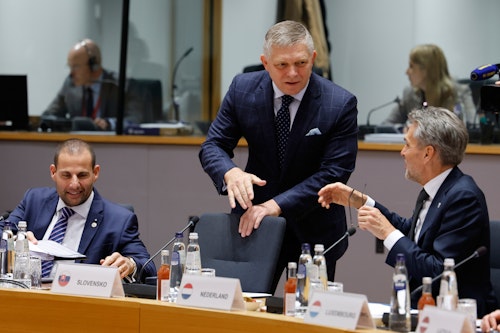
Housing crisis makes it to the EU summit - a novelty
For the first time at a meeting of EU leaders, Thursday's agenda will also include a discussion on the housing crisis.
Between 2010 and 2023, house prices in the EU increased by 48%, while rents increased by 22%. In 2023 alone, almost 9% of the EU population spent 40% or more of their disposable income on housing.
Earlier this week, the EU executive presented its work plan for 2026, which includes two significant housing initiatives.
By spring, Brussels will propose new legislation on short-term rentals, such as those offered on Airbnb or Booking.com. By the end of 2026, there will also be new legislation to accelerate the construction of new homes and reduce bureaucracy for the building sector.
“How can Europe be competitive if people working full-time cannot make a living?” Ursula von der Leyen asked MEPs during the presentation of the Commission’s work programme. “If they cannot afford to live where the good jobs are because they do not find housing?”
EU leaders in Brussels agree that this is a common European problem requiring a European solution. However, such a solution is still a work in progress, given Brussels' limited powers over housing.
Spain's socialist Prime Minister Pedro Sánchez and the President of the European Council, António Costa, have already taken credit for prompting such a political discussion today — a move that is seen as an attempt to boost their socialist credentials at a time when their political family is losing ground across the EU.
EU leaders in Brussels are expected to call on the European Commission to “swiftly present an ambitious and comprehensive plan for affordable housing” to support and complement national efforts.
Dan Jørgensen, the EU’s Commissioner for Housing and Energy, will present such a plan in December to address the financialisation of housing. “It is clear that when housing becomes a commodity, something that is used for speculation with no need to take into consideration the rest of the society, then of course that potentially causes problems,” the Danish commissioner said last week.
Finland's Orpo: Combined sanctions with the US a 'game changer' against Russia
“The US sanctions can be a real game changer when combined with our 19th sanctions package,” said Petteri Orpo, Finland's prime minister, upon his arrival at the European Council.
He added that this is a clear step in the right direction, with all measures being coordinated between Europe and the US to maximise their impact.
“The next issue we need to work on is the use of Russia’s frozen assets. I believe a solution is near. We have a solution on the table that is legally sound and takes into account Belgium’s concerns,” he said, adding that ideally the Commission will be able to present a concrete proposal at the beginning of next year so that these funds can be utilised.
“Using Russian assets is the best solution, morally justified because Russia attacked Ukraine. Alternatives include using European countries’ budgets or creating a joint debt instrument,” he said.
Orpo also stated that after hearing Ursula von der Leyen this morning, he is confident that solutions can be found and that all genuine concerns are being taken seriously.
Photo: Associated Press
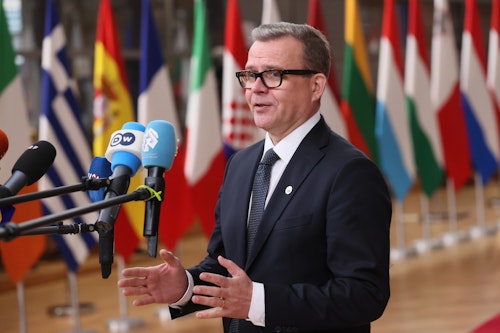
EU summit begins
The EU summit has officially begun.
The discussions will first focus on Ukraine, with President Volodymyr Zelenskyy in the room. Over lunch, leaders will talk defence. After that, they will get into climate and competitiveness.
Stay tuned for more updates.
Merz: Parliament vote against simplification is 'fatal mistake'
German Chancellor Friedrich Merz called the European Parliament's vote against simplification rules "a fatal mistake".
EU lawmakers rejected a bill on Wednesday to simplify rules for European businesses on sustainability reporting and due diligence obligations.
The vote comes amid mounting pressure from some EU member states to pass the bill and from the US and Qatar to scale back the EU's due diligence law contained in it, which in their view risks disrupting liquefied natural gas trade with Europe.
"We need to discuss this with the European Parliament, the rejection of the simplification plan is unacceptable. We agreed it in the Council, [this vote] is a fatal mistake and it has to be corrected.”
"We will discuss with the parties in Parliament how to proceed, but this is unacceptable. We need a quick decision for the EU industry."
Merz also said that his letter to the Commission and Council presidents calling for more measures to increase competitiveness has been signed by 20 leaders.
"We are getting bad news from industry across Europe, we need to act a lot quicker than we did in the past, when it comes to making decisions to reduce bureaucracy," he added.
Lithuanian President warns of ‘disproportionate burden’ to protect the EU’s external border
Lithuanian President Gitanas Nausėda said that his country is facing a “disproportionate” burden in terms of surveillance and protection of the EU’s eastern external border.
“Having in mind how many threats are coming every day, this is actually becoming the routine,” Nausėda argued.
Earlier this week, Vilnius Airport closed overnight after dozens of balloons carrying smuggled cigarettes entered its airspace. Lithuanian authorities blamed Belarus for the incident, which disrupted the travel plans of 4,000 passengers.
The Lithuanian leader said that the EU needs to strengthen its detection capabilities and air defence systems, particularly the short-range ones.
"This is not only my country's business, but the business of all countries along the eastern border."
Nausėda stressed the need for national decisions, as well as European programmes capable of scaling up the bloc’s common defences.
The EU is working on four pan-European defence projects which require significant investment.
The most pressing are: The European Drone Wall, a system designed to detect and neutralise drones entering the EU illegally, and the Eastern Flank Watch, which aims to strengthen the ability of frontline states to counter a range of threats, including hybrid operations and drone incursions.
"We need money for that," said the Lithuanian. 'We can't wait until the next multiannual financial framework. We will do our job starting from today”.
Nausėda also argued that the recently announced US sanctions on Russia are a "game changer".
"It was enough time to understand that you can negotiate with Russia only by putting the gun on the table,” he said.
“Sooner or later they will understand that (not ending the war in Ukraine) leads to the collapse of (the) Russian economy”.
Pedro Sánchez: 'Spain is a reliable ally when it comes to NATO'
Pedro Sánchez is facing a hard time with regards to his relationship with US President Donald Trump and Spain’s contributions to NATO.
He stressed, when asked by Euronews’s Maria Tadeo upon his arrival at the summit, that “Spain is a reliable ally when it comes to NATO”.
“We are fulfilling these obligations, these commitments and these commitments are linked to capabilities. This is what we agreed at the last NATO summit, and this is what we are delivering," Sánchez said.
But for the Spanish prime minister, the main item on his agenda walking into the leaders' gathering, is how will the EU deal with the housing crisis.
The issue, “central” in Spain, can be seen as a ploy by Sánchez to increase his support at home.
“This is the first time in the European Council that we will talk about the housing crisis emergency happening in all Europe, not only Spain," he said.
Sánchez detailed the three points that Spain will bring to the European Council’s table this Thursday:
- Legal measures to be activated by the EU to stop the purchase of houses for non-residential use.
- Secure some leverage at European level to be able to act in cities where the prices of housing are rising exponentially due to the impact of tourism.
- Secure a dedicated fund for building social housing.
“The inability of young and old (people) to access housing is something shared by Spaniards, Italians, French, and Germans — in short, by any citizen living in Europe. Therefore, when we talk about a Europe that serves its citizens, we also must talk about housing," Sánchez said.
EU leaders greet each other in the room
EU leaders are pouring into the main room and greeting each other with kisses and handshakes, which means the summit is about to begin.
The latest arrivals include German Chancellor Friedrich Merz, who stopped to speak with reporters, and French President Emmanuel Macron, who completely skipped the press.
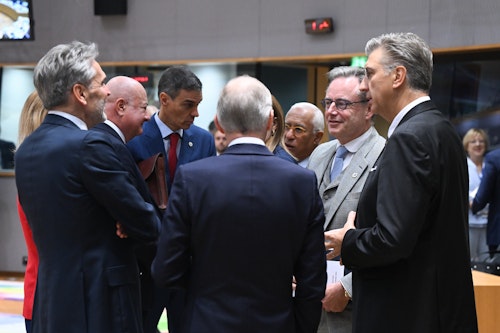
Greece's Mitsotakis: Green transition cannot undermine competitiveness
Greek Prime Minister Kyriakos Mitsotakis said competitiveness can't be discussed "without addressing energy" today.
"The green transition is agreed in terms of climate neutrality goals for 2050, but this green transition needs to ensure that it does not undermine the competitiveness of European industry and the social cohesion," he said.
Climate policy - on today's agenda - is increasingly contested by countries like Germany, Italy and Poland. All of them share an aversion to a green law that will effectively ban new sales of combustion engine cars by 2035.
France demanded that leaders have a face-to-face debate on the need to establish an emissions reduction target for 2040 as a bridge to climate neutrality by mid-century.
The European Commission proposed a reduction of 90% by 2040, but with certain flexibilities for governments and industry. The text faces an uphill struggle to be approved as the political backlash against environmental regulations deepens.
Mitsotakis said that "the key word is flexibility."
"We need to move fast in terms of those technologies that are mature that can bring down CO2 emissions significantly. We need to give time to those technologies that are still immature or that cost a lot of money and ensure that we don’t impose unnecessary burdens on the European industry," he added.
Kaja Kallas hails US sanctions on Russia as 'important sign of strength that we're aligned'
High Representative Kaja Kallas has welcomed the US decision to impose sanctions on Russia. The announcement, targeting Russia's two largest oil companies, Rosneft and Lukoil, marks the first time the second administration of Donald Trump has introduced economic restrictions on Moscow.
"We're very happy," Kallas said upon arrival at the summit in Brussels. "It's an important sign of strength that we’re aligned."
Kallas defended the ground-breaking project to use Russia's frozen assets, most of which are held in Belgium, to issue a €140 billion loan to Ukraine. Under the plan, the assets will only be returned if Russia agrees to pay war reparations.
"The fundamental message is that Russia is responsible for the damages caused in Ukraine and has to pay for those damages," Kallas said.
According to the High Representative, the loan proves to America that "we're taking very important steps ourselves".
Asked about Belgian concerns regarding the loan, which threatened to torpedo the plan, Kallas said: "No country should bear the risks or this burden alone."
Photo credit: Associated Press
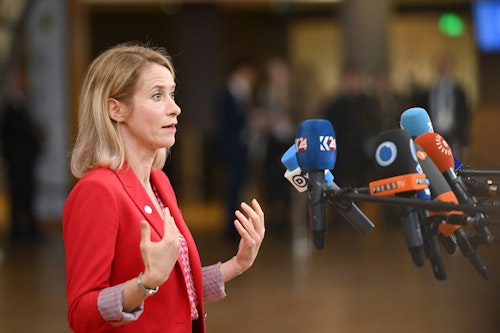
Micheal Martin: Ireland committed to reparation loan despite military neutrality
Irish Taoiseach Micheal Martin, said Dublin is committed to co-guaranteeing the reparations loan for Ukraine, despite the country's status as a militarily neutral state.
He said he doesn't see "any implications" for Ireland's neutrality in acting as co-guarantor in the use of Russian frozen assets in a loan for Ukraine.
"'We are military neutral. We're not members of NATO, we're not members of any military alliance, but countries like Ukraine have a right to defend themselves," he said.
Martin added there must be an "economic cost" for Russia in "violating the UN charter, and territorial integrity of Ukraine and Ukraine's sovereignty", as well as then "destroying the country's civilian infrastructure, energy infrastructure, kill civilians and expect others to pay for it", he said.
"We have to support Ukraine in defending its sovereignty and its territorial integrity from a budget perspective, from a humanitarian perspective, and that is what we are doing," he told reporters.
"I don't believe there are implications [for Ireland's neutrality] but Ireland will act as a co-guarantor no matter what way the legislation."
"There is a lot of detail involved in this and a lot of clarity required. But in terms of the principle of those who flagrantly abuse (there) has to be an economic cost," he also said.
Italian Foreign Minister: 'Many perplexities' with reparation loan plan
Italian Prime Minister Giorgia Meloni did not stop to answer journalists when she entered the Europa Building, but Italy's positions on the summit's topics were expressed by Foreign Minister Antonio Tajani on the sidelines of the EPP summit.
"It seems to me that the United States has been disappointed by Putin’s reaction. A meeting to initiate a second phase of dialogue had seemed possible, but they [Russians] do not want the ceasefire," Tajani said about Wednesday's decision by the US to impose sanctions on Russia.
He thinks that sooner or later Moscow will have to accept a compromise.
"From a military standpoint, the war has been a failure for the Russian Federation. In three years, they haven’t managed to make much progress — even with the men and resources at their disposal, including soldiers from North Korea. Evidently, Russia hopes to move forward and achieve some territorial success, but if they capture just 100 meters of Ukrainian territory, that hardly seems like a great victory — not with a million and a half men and the enormous investments they are making across the entire defense industry."
About the idea to use Russian frozen assets for a loan to Ukraine, which will be one of the most contentious points in the leaders' summit, Tajani stressed the importance of finding a proper legal basis.
"I see that there are many perplexities. We have some ideas on how to define the juridic boundaries for the use of these assets, but this issue must be addressed neither in a Manichean way nor in a superficial one."
Another relevant topic for Italy is the ban on new sales of combustion engine cars by 2035, which Meloni's government hopes to water down by allowing low-emissions engine cars. "If the law stands as it is now, by 2035, we risk losing 70,000 jobs in Italy. How can you explain this to the families?" he said. "When fighting climate change, we cannot ignore the social dimension and the existing social contradictions."
‘No territorial concessions’ for Ukraine, Zelenskyy tells Euronews
Ukraine will not cede any of its territory, Volodymyr Zelenskyy said, answering Euronews' question on whether Kyiv is now being pressured into territorial concessions.
“No territorial concessions,” Ukraine’s president said as he arrived at the EU summit in Brussels just as the EU and the US imposed new sanctions on Russia for Moscow’s refusal to have a ceasefire in Ukraine.
The Kremlin said its demands have not changed, meaning Moscow wants to keep control over Crimea and four other regions of Ukraine, which Russian forces do not control entirely.
Trump himself said on Wednesday that Vladimir Putin did not scale down his territorial ambitions over Ukraine’s invasion.
“I have always felt he wanted the whole thing, not a piece of it,” the US president stated.
Luxembourg: We must remind the US that talking Ukraine means talking Europe
Luc Frieden, Prime Minister of Luxembourg, emphasized upon his arrival at the European Council that Europe must play an active role in supporting Ukraine.
“We need to take a leading role in helping Ukrainians and also remind our American friends that whenever we talk about Ukraine, we talk about Europe,” he said. “Europe is our continent, and we need to sit at the table with them to find a solution for a lasting peace—and I stress the word ‘lasting.’”
Frieden added that Luxembourg will back any measure that ensures a legally sound way to make more Russian funds available to support Ukraine.
“It is a complicated subject, but morally it is right to ensure that Russian state funds in Europe are used properly to support Ukraine,” Frieden said. “A significant improvement compared to the past is that the European Commission is no longer seeking outright confiscation, which would be very difficult, but instead a legally guaranteed solution. That is a big step forward.”
Photo: European Council
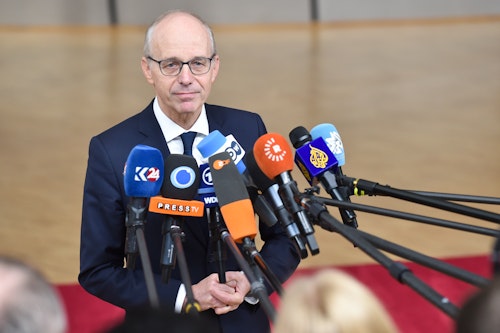
António Costa confident leaders will endorse €140 billion loan for Ukraine
António Costa, the president of the European Council, is confident that the ground-breaking plan to issue a €140 billion loan to Ukraine will receive the backing of EU leaders later today.
"We will take the political decision to ensure the financial needs of Ukraine for 2026 and 2027," Costa said, noting the loan will allow Ukraine to "continue their fight for a just and lasting peace".
"This is the most important message to Russia," Costa added. "Russia needs to understand they need to stop killing civilians in Ukraine."
Approval of the loan is not guaranteed on Thursday: the Belgian prime minister, whose country has a particular stake in the project, says he will do "everything" in his power to block it if his three demands are not met. But Costa appears hopeful that the concerns will be placated.
"We will support Ukraine as long as necessary and whatever it takes," Costa said, speaking next to Volodymyr Zelenskyy. "Welcome to your house."
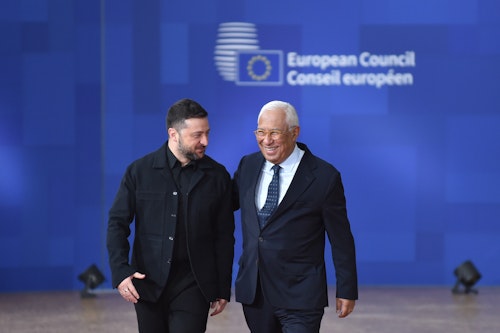
Nexperia could be discussed on side lines of summit: Dutch PM
The turmoil surrounding Netherlands-based chipmaker Nexperia - a subsidiary of China's Wingtech - might come up on the sidelines of the EU Summit today, Dutch Prime Minister Dick Schoof said.
The government dismissed Nexperia’s CEO Zhang Xuezheng last week after issues about improper management.
As a result of the interventions, China has introduced measures against Nexperia, and the products the company makes in China may no longer be exported. German carmakers like Volkswagen and BMW are dependent on their components.
Schoof said that the country is "working hard" on a solution.
"The issue has been discussed in the past days by the Dutch and Chinese economy ministers, as well as some EU counterparts. I am not ruling out (that) it will also be discussed today (on the sidelines)," Schoof said.
"It is very important that the situation will be solved and the chip industry will not be further disrupted," he added.
Read more here by Marta Pacheco, on how US pressure and Chinese restrictions on rare earth metals are disrupting EU supply chains.
Volodymyr Zelenskyy: 'We need more pressure on Russia for a ceasefire '
Volodymyr Zelenskyy, the president of Ukraine, has arrived at the EU summit. Upon arrival, he celebrated the new sanctions announced last night by the EU and the US, calling it a "very important" decision.
The US announcement, targeting Russia's two largest oil companies, Rosneft and Lukoil, marks the first time the second administration of Donald Trump has introduced economic restrictions on Moscow.
"We waited for this, god bless, it will work," Zelenskyy said about the American move. "This is a good signal for other countries in the world."
Asked whether a ceasefire in Ukraine was still possible, he said: "Of course, all of us need a ceasefire, but we need more pressure on Russia for a ceasefire."
"We need fair discussions," he added. "We need lasting peace. This is very important for our nation."
Photo: Associated Press.
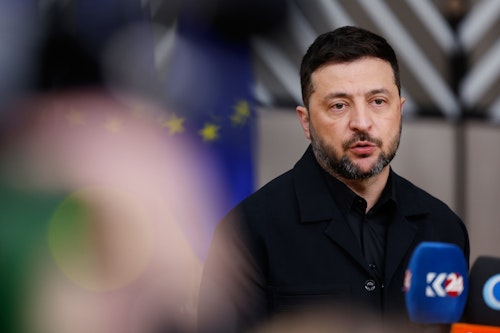
Sweden stands against 'naivety' in trade relations with China
Ahead of the EU leaders' summit in Brussels, Ulf Kristersson, the Swedish prime minister, told reporters that EU countries want to be able to trade with China, particularly in critical raw materials, but they must avoid dependencies and naivety.
"We don't want to be overly dependent on China. We want them to apply the same rules to the European market as we apply to theirs,” he said.
"Basically, we are in favour of free trade in Sweden, but against naivety," he added.
Although China is not formally on today’s agenda, leaders should discuss the recently announced expansion of restrictions on rare earths, which are critical for the digital and green transitions, as well as for the EU’s rearmament efforts.
Beijing’s decision has prompted calls from Germany, France, and Poland for a tougher stance, but member states remain significantly divided over how to respond to such a move.
“I will be ready to propose further measures to ensure Europe's economic security, and I will accelerate what we have already put in motion,” she added.
“A crisis in the supply of critical raw materials is no longer a distant risk. It is on our doorstep,” said EU Commission President Ursula von der Leyen, addressing MEPs in Strasbourg on Wednesday.
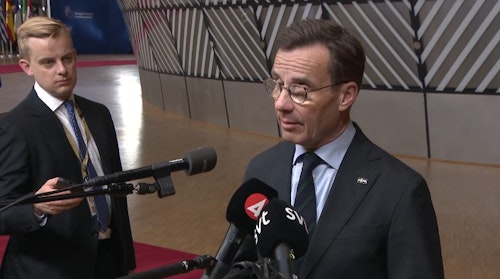
Dutch PM: Belgium cannot carry this alone
Dutch Prime Minister Dick Schoof said, at his last European Council summit before the general election in the Netherlands on 29 October, that Belgium cannot carry the risks of possible Russian retaliation for using its assets immobilised in Europe to finance Ukraine's defence and reconstruction, on its own.
"We must bear a shared risk, not just Belgium on its own."
"It involves a lot of money. The distribution key still needs to be agreed upon. And even if we reach an agreement, [the money] won't be released all at once," he added.
Belgian Prime Minister Bart De Wever said upon arrival that "miracles do happen" when asked about the chances of getting to an agreement.
Schoof said he is not speaking about "miracles" but "good discussions" and how to solve the problem.
Belgian PM threatens to block loan to Ukraine if his three demands aren't met
Belgian Prime Minister Bart De Wever has thrown down the gauntlet on the plan to use Russia's immobilised assets to issue a €140 billion loan to Ukraine: if his demands are not satisfied, he will block it.
Belgium has a particular stake in the ground-breaking project because the bulk of the Russian assets are held at Euroclear, a central securities depository based in Brussels. Under the plan, which is still in early stages, the cash balances at Euroclear will be transferred to the European Commission, which will then issue the loan to Ukraine. The country will only be asked to pay back if Russia agrees to pay reparations.
Upon arrival, De Wever listed three key demands as conditions for his blessing:
- The "full mutualisation" of risks, including legal claims filed by Russia.
- Guarantees to ensure that, if the assets are unfrozen and the money has to be paid back, "every member state will have to chip in".
- An obligation for all European countries that hold Russia's sovereign assets to participate.
"Even during the Second World War, immobilised assets were never touched," De Wever told reporters.
"If we move, we must move all together, that’s European solidarity," he went on. "If these three demands, which are quite reasonable, I think, are met, then we can go forward. If not, I will do everything in my power at the European level and also at the national level, politically and legally, to stop this decision."
De Wever complained about the lack of what he called "legal analysis" and "legal basis" to support the Commission's project and warned that the Kremlin, and possibly its allies, would seize assets of European companies as retaliation.
"The member states must understand that if they take Putin’s money, he will take our money back," he said.
De Wever's remarks raise a high bar for the discussions on Thursday. The summit's conclusions have an open paragraph tasking the Commission with moving forward with the plan so that it can present a fully fledged text by the end of the year.
"I will be surprised if we solve it today, but miracles do happen," De Wever said.
Photo: Associated Press
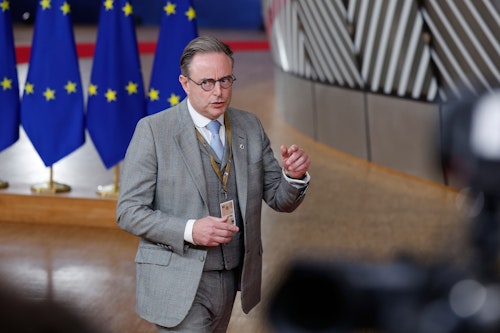
Denmark: Russia should pay for the weapons Ukraine needs to defend itself
Danish Prime Minister Mette Frederiksen told reporters upon arriving at the summit that “it is Russia that has destroyed large parts of the country. Therefore, I think it is completely natural that it is Russia that pays for the weapons Ukraine needs in order to defend itself".
Frederiksen expressed support for using frozen Russian assets already held in Europe to provide financial and military assistance to Ukraine.
She added that Denmark has for several years maintained that Russia should pay for the war damages it has caused, particularly regarding the reconstruction of Ukraine.
“The idea is to use these frozen funds as a kind of credit facility, so that we can transfer money to Ukraine without European taxpayers having to cover the entire cost,” Frederiksen said.
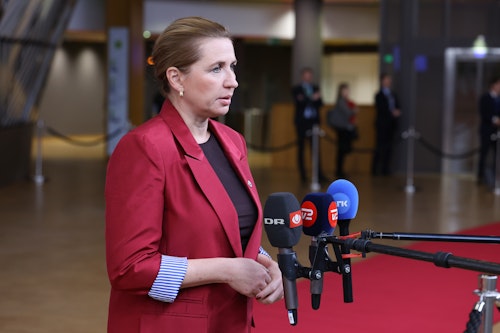
Viktor Orbán not present at the debate on Ukraine, will be represented by Robert Fico
The Hungarian Prime Minister will not be present for the first part of the European Summit as he is scheduled to give a speech at 13:00 in Budapest to mark Hungary's national day that commemorates the 1956 uprising against Soviet rule.
Orbán will arrive around 17:00 in Brussels. Until then, he will be represented by his Slovak counterpart, Robert Fico.
Hungary will not support the conclusions on Ukraine, and this part will be released by the EU26, without Hungary.
Austrian Chancellor: We need 'fair solution' to use Russian frozen assets
Christian Stocker, Austria's centre-right chancellor, told reporters that he has concerns about the use of Russia's frozen assets in a reparation loan EU leaders are considering to finance Ukraine's defence and reconstruction.
"We need to find a reasonable, fair solution that also corresponds to the intentions of the European Union, because it would be surprising if we treated a European company, a company from Europe, from Austria, worse than a Russian oligarch in Putin's sphere of influence."
Manfred Weber: 'Trump understood that cooperation with Putin is not possible'
"Donald Trump understood that peaceful cooperation with this aggressive Putin is not possible," Manfred Weber, the president of the European People's Party, said upon entering the EPP's pre-EUCO summit, commenting on the US decision to impose sanctions on Russia.
"There is no Budapest peace summit, but there are now sanctions from Donald Trump against Putin. That's a political reality, and that means we are stronger now as Europeans together with the Americans in defending our European way of life together with Ukraine", he said. "We are now more united than ever before again with our American friends in our approach to Russia."
"In Alaska, we saw that more red carpet is not possible. Trump did really everything to please Putin and to offer him a lot. And the answer was more bombing against Kyiv and even attacks against Estonia and Poland. That is what we saw during the summer and after summer. [...] Who still believes that we can please Putin and we can be with more diplomatic efforts, and being more active with him is naive," Weber added.
He also said that Wednesday's vote in the European Parliament that rejected the package to simplify rules for European businesses on sustainability reporting and due diligence obligations is "very disappointing".
"We had an agreement within the platform of the pro-European parties in the EU [...] In the plenary, 31 socialist colleagues signed the appeal to reject this common compromise. And that's why I have to ask Iratxe García Pérez [S&D chair] and the socialist team, what is this all about? Can we rely on a signature you give to us?"
Read the story on the Parliament's simplification vote here
What's on the agenda
European leaders are making their way to the summit, but what exactly is on the agenda?
Support for Ukraine, climate goals and China's curbs on rare earths are some of the topics poised to animate the day, and possibly the night.
Here's what you need to know.
Ukraine loan, climate goals and China set to dominate EU summit
Ukrainian President Volodymyr Zelenskyy will attend the EU summit and plead for fresh support after his disappointing visit to the White House.
Here we go again!
Hello and welcome to Euronews' live blog for the leaders' summit that will take place in Brussels on Thursday.
Our crack team of reporters will bring you the latest on the wide-ranging discussions that will cover support for Ukraine, European defence, competitiveness, the Middle East, migration and even, for the first time ever, housing.
Here's the provisional schedule:
- 08:30 Arrivals and doorsteps
- 10:00 Exchange of views with the President of the European Parliament
- 11:00 European Council working session - morning
- 13:30 European Council working lunch
- 15:00 European Council working session - afternoon
- 20:00 Euro Summit working dinner
European Council chief Antonio Costa wants this summit to be a one-day affair so, given the packed agenda, expect us to still be at it well after dinner and into the night.











